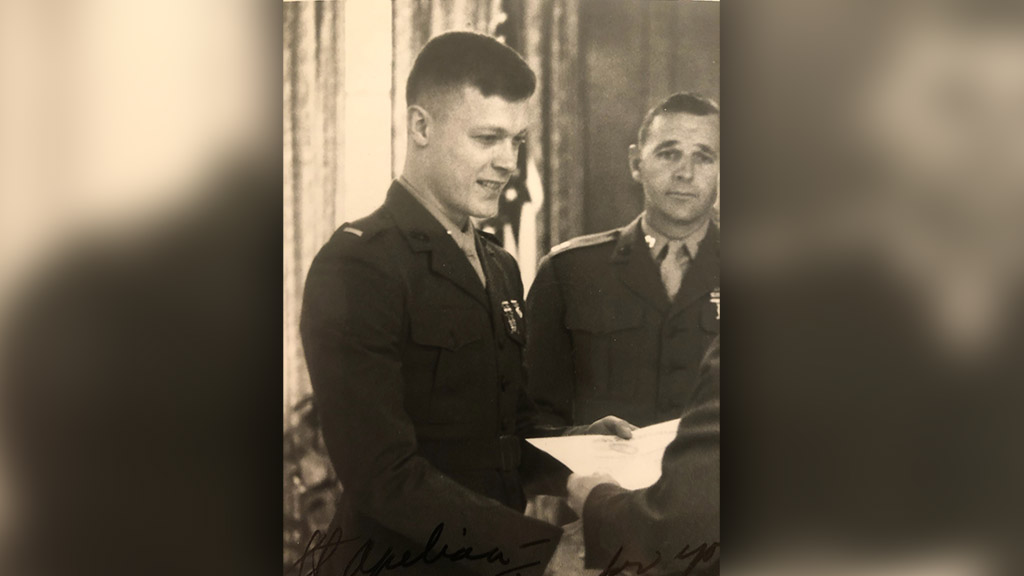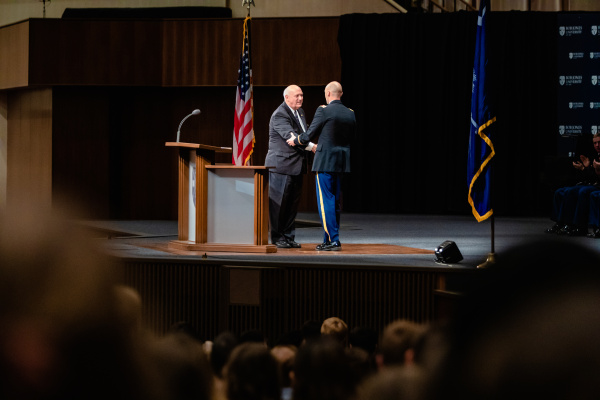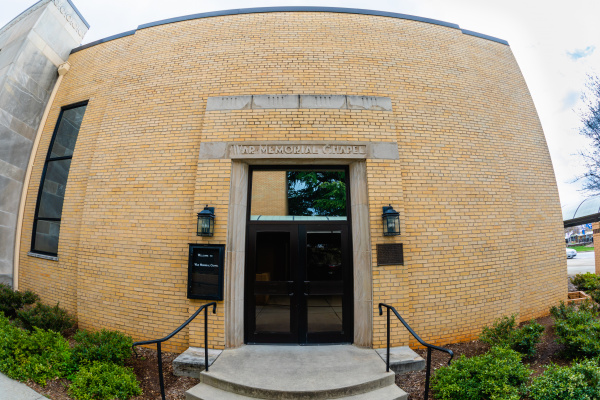Retired U.S. Marine Corps Capt. Bill Apelian, president of BJU Press, said being born in America is “like Willy Wonka and the Chocolate Factory.”
“You won the Golden Ticket when you were born in this country. This is the best country in the world. And our freedoms, they cost a lot — not only to get in the first place but to maintain,” he said. “I think veterans are some of the people who understand that and can pass that message on to the rising generations of young people.”
Veterans Day is designated to honor men and women who have recognized the United States, in Apelian’s words, as “a nation that was founded on a set of principles that grew out of the great traditions of western civilization, the Judeo Christian principles that allowed us to be the culmination of western civilization.”
There is much to learn from their stories.
Service in the Middle East and on the Mess Deck
Apelian joined the United States Marines Corps in 1974 as a college student. Some of his high school classmates had gone to fight in the Vietnam War in 1972. A couple were killed, which prompted Apelian to join the fight against the Communist threat.
“My mother said no, you have to go to college first. I really didn’t want to, but she prevailed, and I went to college,” he recalled. “By the time I graduated the whole thing was over.”
Deployed to the Middle East
Apelian was on active duty from 1976 until 1981, during which he was a company commander at Camp Lejeune, North Carolina, and was deployed during the Iran Hostage Crisis.
“My unit was deployed to the Middle East,” he said. “Our unit was part of the unit that was charged with getting the hostages out of Tehran, Iran. … Parts of my unit were, initially anyway, tasked with inserting themselves into Tehran, creating diversions, getting the hostages out via helicopter airlift and then transporting them back to friendly territory.
“But diplomacy intervened, and the government decided to go in a different direction, so we were just basically on the ready. We did have some units that went into the Middle Eastern landmass … but they never actually carried out the mission.”
Developing a Brotherhood
Other stories Apelian tells show the camaraderie that he and his brothers in arms shared. “Storms at sea are always interesting,” he said. While the table was welded to the floor and the tablecloths were wet down so paper plates didn’t slide around, the chairs were not secured. “Everybody’s sliding down and crashing into the bulkhead and then the ship would roll the other way and everybody would slide back.”
Once, he said that he “went down on the ladder to the mess deck, and apparently somebody had spilled their chow. There were guys just laughing their heads off. A lot of the crew was sliding around in mashed potatoes and gravy. It looked like a huge food fight. … It was hysterical.”
Apelian also tells a story of when his ship pulled into port and his crew was lining up to call home. “There was no way to contact anybody back in the day. … So when we would pull into a port, there was like one telephone. You had a whole ship waiting in line to use the telephone. I stood in line for an hour and a half to call home and talk to my wife. I’d been gone so long that when I got to the telephone, I couldn’t remember our phone number. It did come to me, but there were a whole bunch of very unhappy people behind me while I was racking my brains.
“There’s a lot of fun things that happen in the military. It’s not all serious.”
The fun as well as the danger shared between soldiers forges a bond stronger than many blood brothers share. Said Apelian: “They say ‘We few, we happy few, we band of brothers,’ as Henry said in Henry V, but it’s true. It’s a bond of brothers. You care for each other and you protect each other, and there’s this unit cohesiveness that grows, and there’s strength in that.”
Lessons from the Trenches
Apelian gained valuable life lessons from his years in military service. “I love the Marine Corps,” he said, “and I learned a lot about leadership and organization and discipline, getting the job done, being prepared, or getting everything laid out so that you can accomplish things quickly and efficiently and effectively. You know, proper prior planning prevents poor performance.”
It is Apelian’s opinion that more young men should join the military. “Guys mature a little later. The military really helps with that,” he said. “You get a sense of responsibility, of duty. You apply yourself. When I joined the military, I was in college at the time. My grades went skyrocketing after I got back from boot camp. I didn’t do badly before that, but when I got back it was, let’s get the work done. Get the work done first, and then if you have time for anything else, that’s great. I was much, much, much more disciplined.”
Not only did Apelian learn practical skills such as personal discipline and organization, but he also learned the value of depending on his fellow soldiers. “I remember every time we got close to a Soviet ship we went to general quarters. We’d go to battle stations, and we’d lock and load because we didn’t know — this was back (when the Soviet Union) was still here — we didn’t know if they were going to fire on us. We had no idea what was going to happen. And that sense of depending on one another in that kind of life and death way is, I think it’s valuable.”
Advice on Veterans Day
On Veterans Day or any day, Apelian says, the best way to show appreciation for those who have served in the United States armed forces is “by upholding the principles upon which this country is founded: a love of God, that’s of course primary, and a love of country. By being bold in the face of adversity. By not being afraid of taking a position that isn’t popular but is nonetheless right and scriptural and/or constitutional. That’s really the heritage that veterans want to see carried on.
“My parents and my father-in-law, they were all in World War II, and there’s hundreds of thousands of people (who) died. And then there’s Korea and there’s Vietnam to preserve the last great hope of man on earth, from a human standpoint, which is what Ronald Reagan called America in 1964.
“There’s no place else to go. Sometimes you think, what will happen if we start going socialist? Where will I go to? Well, there isn’t anyplace else. You can’t go to Europe or Asia or South America. America is the beacon of freedom and liberty.
“So if you want to honor veterans (preserving that heritage is) the best way.”








